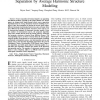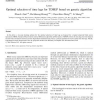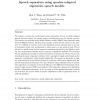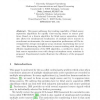113
click to vote
TASLP
2002
15 years 1 months ago
2002
Convolutive blind source separation and adaptive beamforming have a similar goal--extracting a source of interest (or multiple sources) while reducing undesired interferences. A be...
107
click to vote
TNN
2008
15 years 2 months ago
2008
Separation of speech mixtures, often referred to as the cocktail party problem, has been studied for decades. In many source separation tasks, the separation method is limited by t...
119
click to vote
TASLP
2008
15 years 2 months ago
2008
Source separation of musical signals is an appealing but difficult problem, especially in the single-channel case. In this paper, an unsupervised single-channel music source separa...
111
click to vote
DSP
2007
15 years 2 months ago
2007
We tackle the general linear instantaneous model (possibly underdetermined and noisy) where we model the source prior with a Student t distribution. The conjugate-exponential char...
138
click to vote
IJON
2006
15 years 2 months ago
2006
In this letter, a two-step learning scheme for the optimal selection of time lags is proposed for a typical temporal blind source separation (TBSS), Temporal Decorrelation source ...
103
click to vote
FSS
2006
15 years 2 months ago
2006
Convergence of blind delayed source separation algorithms, which use constant learning rates, is known to be slow. We propose a fuzzy logic based approach to adaptively select the...
119
click to vote
CSL
2010
Springer
15 years 2 months ago
2010
Springer
We present a system for model-based source separation for use on single channel speech mixtures where the precise source characteristics are not known a priori. The sources are mo...
121
click to vote
3DPVT
2006
IEEE
15 years 6 months ago
2006
IEEE
We present an alternate approach to the problem of structure from motion (SfM) with noisy point measurements. With no information available about the joint density of three-dimens...
127
click to vote
ICA
2007
Springer
15 years 6 months ago
2007
Springer
This paper addresses the tracking capability of blind source separation algorithms for rapidly time-varying sensor or source positions. Based on a known algorithm for blind source ...
112
click to vote
IDA
2009
Springer
15 years 6 months ago
2009
Springer
We investigate the problem of source separation in images in the Bayesian framework using the color channel dependencies. As a case in point we consider the source separation of co...




